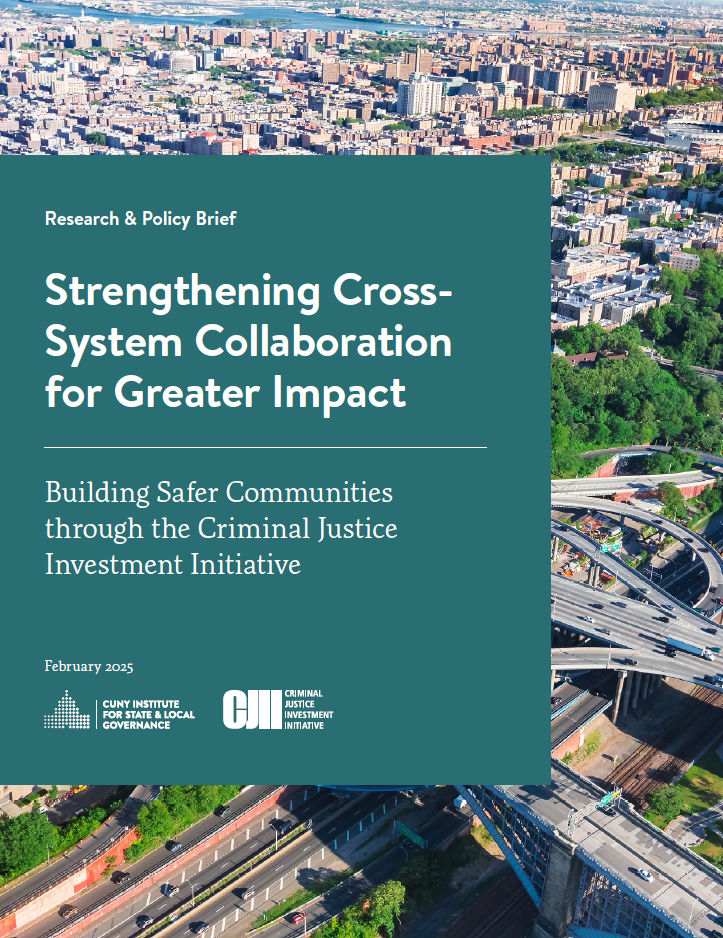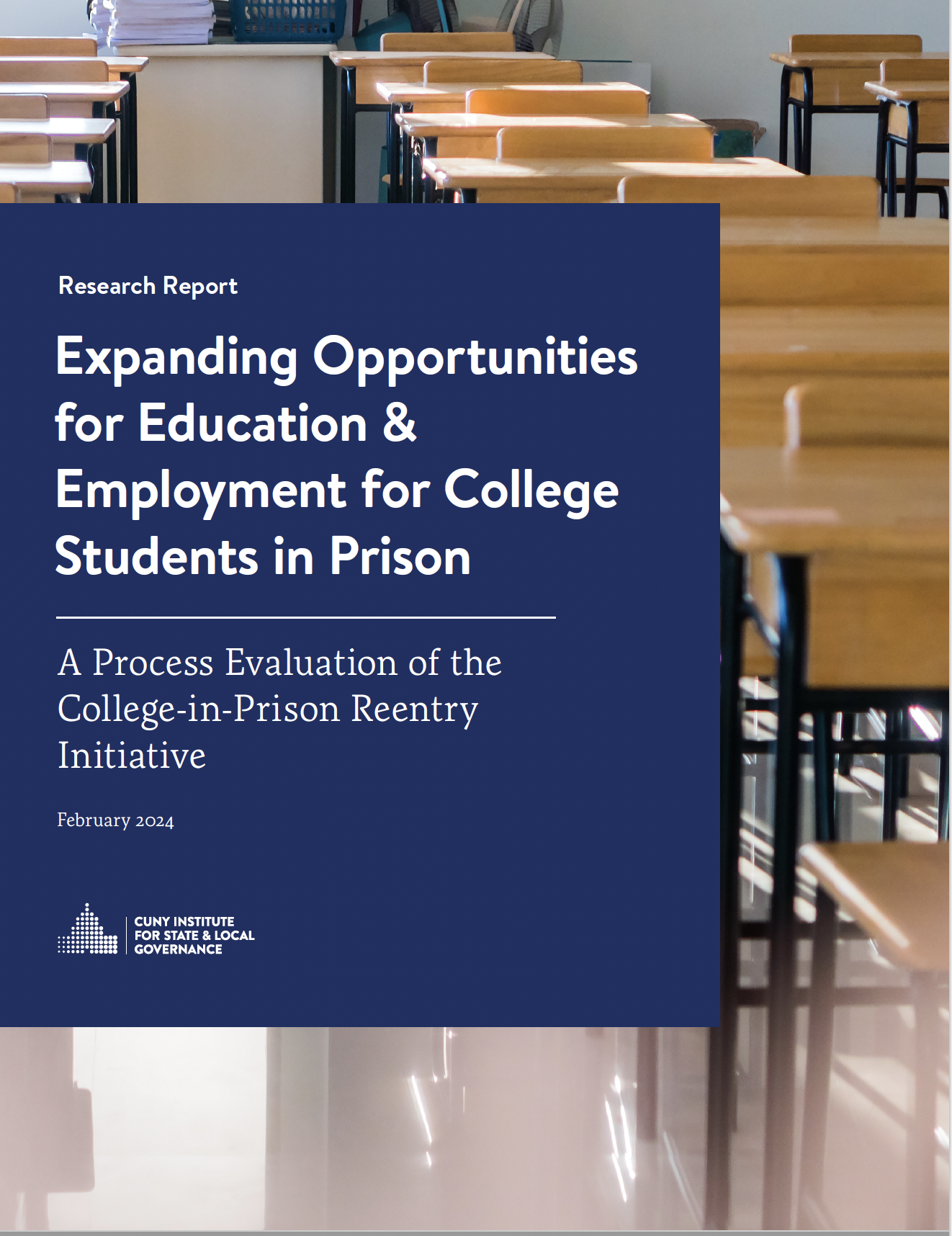RESOURCES
Knowledge Center
Outcomes, discoveries, and analysis from our breadth of good governance initiatives.

A Blueprint for Social Service Navigation in NYC and Beyond
Drawing from a wealth of experience developing service navigation programs as well as research on data-informed, community-responsive approaches, this brief provides a guide to developing navigation programs that can help government and public institutions connect communities with care, creating safety and opportunity for all.
![[From Our Partners] New York City Health Justice Network Recidivism Evaluation Study](https://images.squarespace-cdn.com/content/v1/5fcea962a1b4d771ad256fcc/4c7942d9-5c6a-4cd4-80d5-3bcee559f83f/Screenshot+%2847%29.png)
[From Our Partners] New York City Health Justice Network Recidivism Evaluation Study
Through CJII funding, NYU-CUNY Prevention Research Center (PRC) conducted an outcome evaluation of the NYC Health Justice Network program. The final report findings offer preliminary evidence of NYC HJN’s ability to reduce future criminal legal system involvement among participants.

The Criminal Justice Investment Initiative: Synthesizing a Decade of Innovation
Reflecting on the past decade of work, this series of briefs take stock of CJII’s goals in key areas, dives into case studies of the real-life impact community organizations achieved, and provides a blueprint for practitioners, researchers, policymakers, and funders to shape the future of public safety partnerships.
![[From Our Partners] A Community-Focused Approach to Addressing Trauma: Lessons Learned from the Center for Trauma Innovation](https://images.squarespace-cdn.com/content/v1/5fcea962a1b4d771ad256fcc/4d92b04e-7218-43d8-8576-feb0ba0379cf/Process+Report+Cover+Screenshot.png)
[From Our Partners] A Community-Focused Approach to Addressing Trauma: Lessons Learned from the Center for Trauma Innovation
This brief showcases how learning communities can be used to support innovation, growth, and collaboration among organizations working toward shared outcomes. The Center for Trauma Innovation, a CJII-funded project, is used as a case study.
![[From Our Partners] Evaluation of the West Harlem Community Reentry and Restoration Project ](https://images.squarespace-cdn.com/content/v1/5fcea962a1b4d771ad256fcc/9bb14f13-b3d2-474b-9416-b5e2f2ff5ec2/full+-+Evaluation+of+the+West+Harlem+Community+Reentry+and+Restoration+Project.png)
[From Our Partners] Evaluation of the West Harlem Community Reentry and Restoration Project
Through credible messengers, restorative justice, and a capacity-building incubator, WHCRRP provided direct services to those in Manhattanville and the Grant Houses and surrounding area in the West Harlem community.

Building Strong Communities through Strategic Investments
Reflecting on the past decade of work, this model brief takes stock of these four CJII goals; discusses how DANY, CUNY ISLG, and other partners achieved them; and provides a blueprint for practitioners, researchers, policymakers, and funders.
![[From Our Partners] Build-Out of Student Services Report: Findings from the Process Evaluation](https://images.squarespace-cdn.com/content/v1/5fcea962a1b4d771ad256fcc/ba263fec-6abe-48c4-bee8-c25eb4a19844/Vera+Boss+process+evaluation+full+cover.png)
[From Our Partners] Build-Out of Student Services Report: Findings from the Process Evaluation
In 2019, College and Community Fellowship (CCF) received CJII funding to launch the Build-Out of Student Services (BOSS) project, which provides reentry programming based in New York City that develops education and career skills specifically among formerly incarcerated women.

Expanding Opportunities for Education & Employment for College Students in Prison
CIP funded seven colleges and universities to deliver college instruction across 17 prisons in New York from Fall 2017 through Spring 2022. CUNY ISLG conducted a multiyear process evaluation of the Initiative to assess its implementation
![[From Our Partners] Programs for Foster Youth Transitioning to Adulthood Evaluation](https://images.squarespace-cdn.com/content/v1/5fcea962a1b4d771ad256fcc/73c32228-3431-4ee6-b728-82e7bbf7166c/WHCRRP+mid-eval+full+cover.png)
[From Our Partners] Programs for Foster Youth Transitioning to Adulthood Evaluation
Graham Windham’s “Graham SLAM (Support, Lead, Achieve, Model)” and The Door’s “Academy” offer New York City foster youth transitioning to adulthood personalized support through mentorship, coaching, and youth-driven services.
![[From Our Partners] The NYC Health Justice Network Recidivism Evaluation Study](https://images.squarespace-cdn.com/content/v1/5fcea962a1b4d771ad256fcc/4d9294c0-a174-4547-b5a7-4bac858531b5/NYC+HJN+Evaluation+report+full+cover.png)
[From Our Partners] The NYC Health Justice Network Recidivism Evaluation Study
The study found a strong, significant, and consistent effect of college participation on reducing new convictions following release. Participation in this form of postsecondary education reduced reconviction by at least 66 percent.
![[From Our Partners] Evaluation of the West Harlem Community Reentry and Restoration Project](https://images.squarespace-cdn.com/content/v1/5fcea962a1b4d771ad256fcc/73c32228-3431-4ee6-b728-82e7bbf7166c/WHCRRP+mid-eval+full+cover.png)
[From Our Partners] Evaluation of the West Harlem Community Reentry and Restoration Project
The West Harlem Community Reentry and Restoration Project (WHCRRP) is an initiative funded under CJII in response to the June 2014 law enforcement intervention that led to the arrest and indictment of 103 individuals living in the Manhattanville and Grant public housing developments and surrounding areas.
![[From Our Partners] FamilySafe Project Evaluation: Implementation and Outcomes of Family-Focused Counseling for Survivors of Gender-Based Violence ](https://images.squarespace-cdn.com/content/v1/5fcea962a1b4d771ad256fcc/98d9a429-34de-40f9-91bd-5634327ddb0f/Report+cover+of+FamilySafe+Project+Evaluation.png)
[From Our Partners] FamilySafe Project Evaluation: Implementation and Outcomes of Family-Focused Counseling for Survivors of Gender-Based Violence
Sanctuary and STEPS successfully designed and continue to implement a trauma-focused model of programming that treats diverse families as a unit and facilitates communication and collaboration between the adult and child treatment staff
![[From Our Partners] Addressing Trauma Among School-Aged Children](https://images.squarespace-cdn.com/content/v1/5fcea962a1b4d771ad256fcc/d20aa296-5ce3-482e-bdad-912acc2c3e90/MP-City+Process+Eval+Report+Cover.png)
[From Our Partners] Addressing Trauma Among School-Aged Children
Margaret's Place aims to raise awareness about experiences of trauma and violence among youth and provide direct interventions for those impacted, with particular attention to the many types of violence (e.g., home, community, and dating) experienced by young people. This report presents findings from the process evaluation of Margaret’s Place that was conducted between 2019 and 2021.
![[From Our Partners] Youth Opportunity Hubs: Fostering Collaboration. Building Resilience.](https://images.squarespace-cdn.com/content/v1/5fcea962a1b4d771ad256fcc/5d94a3aa-496a-431f-b2ff-b815bc6d7125/Youth+Opportunity+Hubs+Fostering+Collaboration.+Building+Resilience.+Policy+brief.png)
[From Our Partners] Youth Opportunity Hubs: Fostering Collaboration. Building Resilience.
The Youth Opportunity Hub (YOH) Initiative was designed to prevent or reduce criminal legal system interactions, improve life outcomes, and provide support for youth by fostering access, collaboration, and partnership among social service providers. The final evaluation report, and its associated policy brief, offers a look at the development, implementation, and outcomes of the Initiative, as well as offers lessons learned and recommendations for other organizations seeking to implement similar programs.
![[From Our Partners] An Evaluation of a Workforce Development Program for Domestic Violence Survivors in New York City](https://images.squarespace-cdn.com/content/v1/5fcea962a1b4d771ad256fcc/7543fe10-0203-4ccb-93ae-aaba563b4e85/SFF+CRTP+Eval+full+cover.png)
[From Our Partners] An Evaluation of a Workforce Development Program for Domestic Violence Survivors in New York City
The goal of the Career Readiness Training Program (CRTP) is to help New York City’s economically marginalized families overcome barriers to financial independence, such as chronic unemployment exacerbated by abuse, structural discrimination, the stigma of poverty, limited opportunities for education, and shelter system dependence. By participating in the CRTP, survivors, who are often concerned for their safety and that of their children, have an opportunity to regain financial control and get a fresh start in life.
![[From Our Partners] An Evaluation of the Medical Legal Partnership](https://images.squarespace-cdn.com/content/v1/5fcea962a1b4d771ad256fcc/e612bc2f-01c6-4ef7-8d66-0ac5292c0ca7/Screenshot+2023-01-19+at+9.17.43+AM.png)
[From Our Partners] An Evaluation of the Medical Legal Partnership
The Medical Legal Partnership aims to positively affect the community by (a) improving functioning among families of youth at high risk for criminal legal involvement and (b) improving coordination between mental health services and legal services for youth at high risk for criminal justice involvement.
![[From Our Partners] Conducting Research with the Deaf Community](https://images.squarespace-cdn.com/content/v1/5fcea962a1b4d771ad256fcc/270b9bd7-04f6-4122-a800-46c6f7664d0e/BFL+final_full.png)
[From Our Partners] Conducting Research with the Deaf Community
In this brief, the Urban Institute and Gallaudet University describe the methods they used to evaluate Barrier Free Living’s (BFL’s) Deaf Services (DS) program, which aims to improve direct services for domestic violence survivors who are deaf and increase local stakeholders’ awareness of deaf survivors’ needs in New York City.
![[From Our Partners] Strengthening Domestic Violence Services for Deaf Survivors: An Evaluation of Barrier Free Living’s Deaf Services Program](https://images.squarespace-cdn.com/content/v1/5fcea962a1b4d771ad256fcc/0d149b6b-fc97-4bdb-b786-723b75cc1b48/BFL+eval+cover_full.png)
[From Our Partners] Strengthening Domestic Violence Services for Deaf Survivors: An Evaluation of Barrier Free Living’s Deaf Services Program
Research indicates deaf people report experiencing victimization at higher rates, but a lack of accessible resources and trauma-informed services for American Sign Language (ASL) speakers makes it difficult for deaf people to report crimes and access support.
In response to these issues, the Manhattan District Attorney’s Office (DANY) has provided funding to support Barrier Free Living’s (BFL’s) Deaf Services (DS) program since 2017 through its Criminal Justice Investment Initiative (CJII).
![[From Our Partners] Addressing Trauma Among School-Aged Children: Early Findings from the Implementation of the Margaret’s Place Program](https://images.squarespace-cdn.com/content/v1/5fcea962a1b4d771ad256fcc/e028e979-dc10-4926-9210-0128fedf839c/Addressing+Trauma+Among+School-Aged+Children+report+full+cover.png)
[From Our Partners] Addressing Trauma Among School-Aged Children: Early Findings from the Implementation of the Margaret’s Place Program
In recent years, the number of school-based programs addressing the impact of violence and trauma in children and youth has grown. This report presents the methods, findings, and recommendations from the interim evaluation of the Joe Torre Safe at Home Foundation’s Margaret’s Place program.
![[From Our Partners] An Evaluation of the Trauma-Informed Abusive Partner Intervention Program: Interim Results](https://images.squarespace-cdn.com/content/v1/5fcea962a1b4d771ad256fcc/1652295922257-MWJ66KAFZFSJQS1WDW4O/Screenshot+%28124%29.png)
[From Our Partners] An Evaluation of the Trauma-Informed Abusive Partner Intervention Program: Interim Results
In recent years, domestic violence (DV) experts have called for programs with traditional models to incorporate trauma-informed approaches that better consider participants’ trauma histories, needs, and experiences. One DV service organization in New York City, the Urban Resource Institute (URI), created a program that aims to incorporate such innovative practices.
